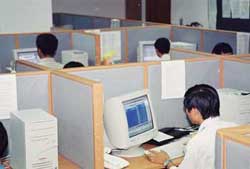 Integrating desktop computers (PCs) into the operations of small and medium-sized enterprises (SMEs) is not a difficult task, but it requires careful consideration. There are many uncertainties that can arise. Applications may not be compatible with new or existing operating systems, and users may lose important settings and documents. We spoke with Mr. Mike Tan, Senior Regional Director responsible for emerging markets and Vietnam at DELL, about this issue.
Integrating desktop computers (PCs) into the operations of small and medium-sized enterprises (SMEs) is not a difficult task, but it requires careful consideration. There are many uncertainties that can arise. Applications may not be compatible with new or existing operating systems, and users may lose important settings and documents. We spoke with Mr. Mike Tan, Senior Regional Director responsible for emerging markets and Vietnam at DELL, about this issue.
* What do SMEs require from desktop computers, and what should they consider when purchasing a large number of desktops for their employees?
– A desktop computer needs to have a reliable platform to ensure the daily operational performance of an office. The first and most important step is to purchase all software programs or hardware devices from a reputable supplier. When buying multiple desktop computers, it is best for SMEs to buy from a single supplier at the same time (and it would be even better if these businesses could also purchase servers, printers, and monitors from the same source). Furthermore, when issues arise, the products need to receive full support from the manufacturer. This is a crucial and essential part often faced by SMEs since most of them do not have dedicated IT staff to handle problems. Most PC purchasing decisions are based on a synthesis of the computer’s specifications, with the most notable being processor speed, memory capacity, and storage.
If SMEs need to equip 100 desktop computers, they should consider management PCs such as the Dell OptiPlex, which offers features designed to facilitate easier and more economical management and deployment. The OptiPlex product line uses standardized hardware and software that provides long-lasting performance, thus minimizing upgrade costs. These devices are designed for quick and easy swapping for users. Additionally, SMEs can manage and control computers remotely through current management software. Many management PCs are also designed to be compact and are an ideal choice for limited workspace.
* What are the differences between PCs for individual users and PCs for businesses? Can SMEs use PCs designed for individual users?
– When producing computers for business operations, manufacturers focus on enhancing specific aspects such as software stability, corresponding technologies for business users, and simplifying deployment and management. In contrast, PCs for individual users are designed for various use cases, such as photography, music, and entertainment. While SMEs can purchase and use PCs designed for individual users, these computers may not meet the business requirements of the enterprise. Therefore, the results will always be better when equipping PCs that are specifically designed to provide business performance.
 |
Mr. Mike Tan – Senior Regional Director responsible for emerging markets and Vietnam at DELL |
* How will SMEs ensure security for newly equipped computers?
– One of the most important things that SMEs can do to protect their PCs is to always update antivirus programs and establish firewalls. Most antivirus programs and firewalls have automatic update settings for the latest protective measures. SMEs should also consider an additional layer of defense at the email server level. Additional antivirus programs for Exchange Server as well as most other popular email servers are always available. However, these programs should not replace standalone antivirus programs.
Policies restricting the downloading and usage of personal applications can save a lot of costs on troubleshooting and other support expenses. Passwords should be changed regularly. Central servers and routers need to be kept in a safe, clean, and ventilated location. SMEs should also have a good backup system in place. Backup strategies should be implemented on multiple layers.
* What are the current industry trends for business PCs?
– Some of the latest trends in business desktop computer technology include: PCI-Express; Serial ATA hard drives; higher-speed memory with DDR2; EM64T.
* Why should SMEs consider Dell business computers for their operational needs? Specifically, what does Dell offer for businesses planning to purchase a large number of PCs for business purposes?
– Dell OptiPlex desktops are developed for customers who need the most reliable systems in network environments such as enterprises and government. Broad compatibility also contributes to the stability of the OptiPlex system.
Dell computers differ from products by other manufacturers due to their unique on-demand business model. Dell’s customizable solutions, along with the latest corresponding technologies, are always available to serve customers at competitive costs and performance. This unique customization aspect is especially appealing to SMEs, as they often have diverse business needs and require different business tools compared to larger companies.


















































